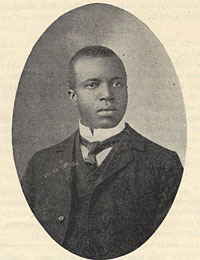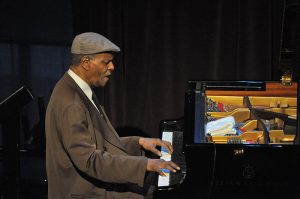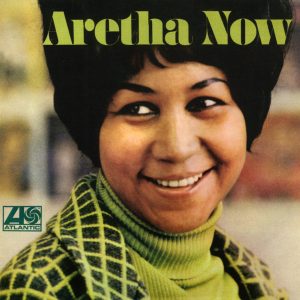 There is no one true American music, of course. There are many: Blues, jazz, rock and roll and others. They blend into each other in unpredictable permutations. Ragtime is a fundamental building block of all of them, and it holds a special place in the mix.
There is no one true American music, of course. There are many: Blues, jazz, rock and roll and others. They blend into each other in unpredictable permutations. Ragtime is a fundamental building block of all of them, and it holds a special place in the mix.
When played softly and slowly, ragtime is a poignant reminder of an earlier America. When played quickly, ragtime essentially is early party music.
The undisputed king of ragtime piano is Scott Joplin. Here is how the Scott Joplin International Ragtime Foundation describes the uncertainty around the artist:
Sedalia, Missouri was Scott Joplin’s home for only a few years, but it was a home with a special meaning for him. It is with good reason that Sedalia has become central to the Joplin story and the site of the annual Scott Joplin Festival.
There is no question as to Joplin’s greatness, his talent, his importance in the history of ragtime and American music. Yet, for all his prominence and recognition, many of the facts regarding his life still elude us.
We are not quite sure, for example, where or when he was born. The best we can say is that he was born in Texas, probably in the northeast part of the state, for the U.S. Census locates him there in July 1870 as a two-year-old child.
That he was already two at that time (and was twelve when the next Census was taken, in June 1880) indicates that the frequently-cited and celebrated birth date of November 24, 1868 is incorrect. So then, when was he born? Available documents point to a birth between June 1867 and mid-January 1868. When he was still a young child, his family left the farm on which his father (formerly a slave) worked as a laborer. They moved to the newly established town of Texarkana, which straddles the Texas-Arkansas border. The Joplins lived on both sides of the border.
Wikipedia describes a musical form striving to gain respect:
The combination of classical music, the musical atmosphere present around Texarkana (including work songs, gospel hymns, spirituals and dance music) and Joplin’s natural ability has been cited as contributing significantly to the invention of a new style that blended African-American musical styles with European forms and melodies, and first became celebrated in the 1890s:ragtime.[10]
When Joplin was learning the piano, serious musical circles condemned ragtime because of its association with the vulgar and inane songs “…cranked out by the tune-smiths of Tin Pan Alley.”[50] As a composer Joplin refined ragtime, elevating it above the low and unrefined form played by the “…wandering honky-tonk pianists… playing mere dance music” of popular imagination.[51]This new art form, the classic rag, combined Afro-American folk music’s syncopation and 19th-century European romanticism, with its harmonic schemes and its march-like tempos.[39][52] In the words of one critic, “Ragtime was basically… an Afro-American version of the polka, or its analog, the Sousa-style march.”[53] With this as a foundation, Joplin intended his compositions to be played exactly as he wrote them – without improvisation.[27] Joplin wrote his rags as “classical” music in miniature form in order to raise ragtime above its “cheap bordello” origins and produced work that opera historian Elise Kirk described as, “… more tuneful, contrapuntal, infectious, and harmonically colorful than any others of his era.”[15]
Some speculate that Joplin’s achievements were influenced by his classically trained German music teacher Julius Weiss, who may have brought a polka rhythmic sensibility from the old country to the 11-year old Joplin.[54] As Curtis put it, “The educated German could open up the door to a world of learning and music of which young Joplin was largely unaware.”[50] (Continue Reading…)
The irony is that we what in essence are recordings of Scott Joplin playing. I am not sure whether the speed is correct, however. Joplin is quoted as saying that ragtime should be played slowly. That’s hardly the case in these samples.










Add Comment